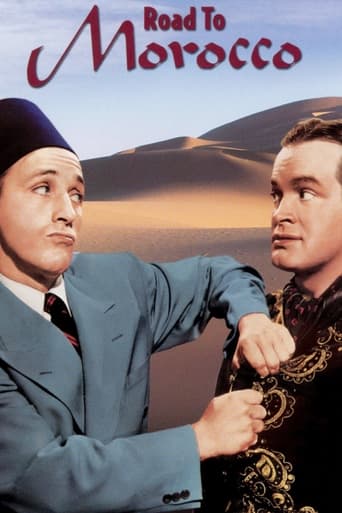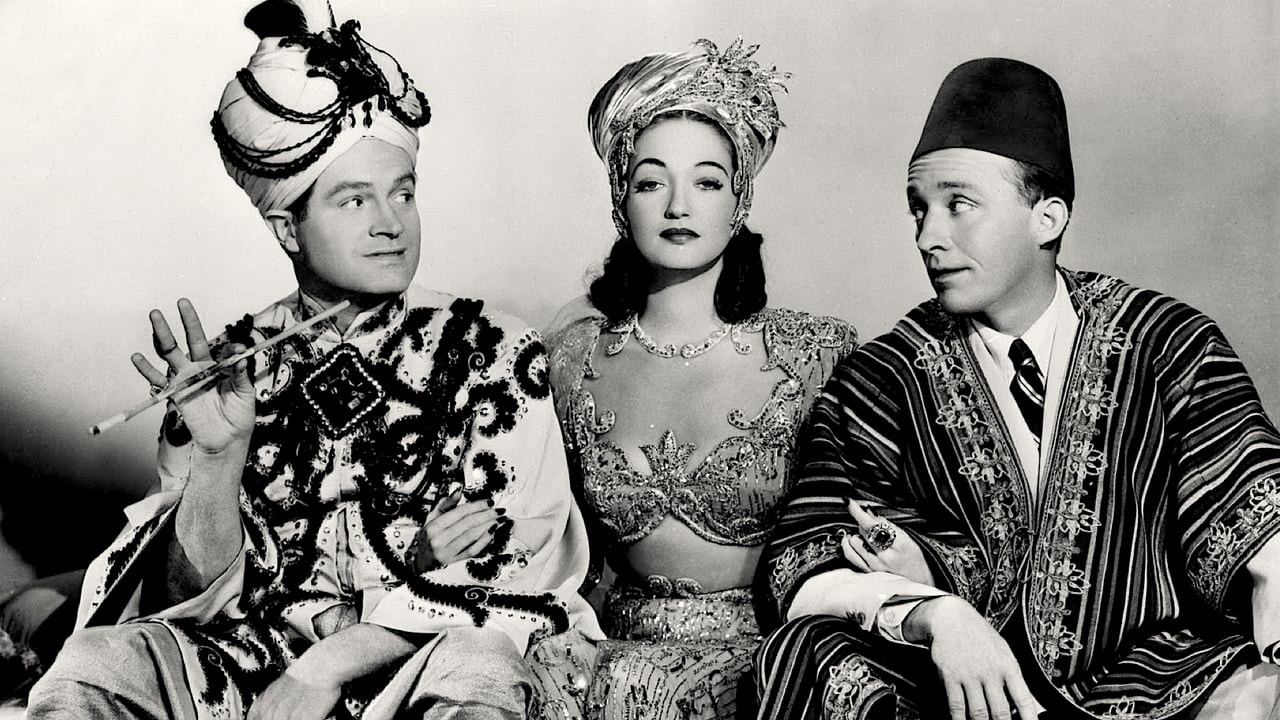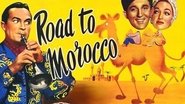campbell-russell-a
Hollywood once depicted Arabs as a bunch of nomadic, tent-dwelling cut throats or greasily cunning conmen out to rip off tourists in bazaars. On TV in the 1970's, they became respected oil sheiks who walked out of negotiations with the western world with confident smiles born of their new-found power and wealth. Perhaps they had just watched "The Road to Morocco" and were musing upon how the wheel of fortune had turned in their favour. The depiction of the women of the Middle East has also made a U-turn. They were once exotic bellydancing nyphs, now a set of black mailboxes. Arab leaders like Mullay Kasim as played by Anthony Quinn looked a bit dangerous but were easily outwitted by Bing and Bob. Mullay confronts the pair with: "Do you dare oppose the will of Mullay Kasim?" to which Bing's character replies:"Oppose it! I'll have you writing one." Today's Arab leaders have at worst been transformed into evil fanatics to be feared and hated and at best to be shifty and potentially treacherous."The Road to Morocco" is fun and makes fun of all stereotypes and customs - east and west. Bing selling Bob into slavery could be seen as a comment on the rapaciousness of capitalism or just another bit of outrageous fun. The best thing about watching it is that like Bing and Bob, we are all just along for the ride. Their "Road" characters are comic existentialists of the highest order - they appear from nowhere, live in the moment and fade out in a finale that underscores the fact that it has all just been a film. I know that the world has serious problems but it doesn't do us any harm to remember that like Bob and Bing, we need to get as much as we can out of our adventure while we can. It's also good to be able to share it with a friend. Thanks go to my dad who went through The Great Depression and fought in WW2 and who introduced me to the "Road" movies.
classicsoncall
Even if you haven't seen the film but know the principals, you can figure out who's saying my summary line, who it's about, and who the speaker is saying it to. If you can't, you've never seen a Road show.The picture isn't much more than a showcase for Crosby and Hope to fire off their one-liners and get in a few decidedly successful song numbers, but it's the type of film I always enjoy watching for sheer entertainment value. The gags are fast and furious, and there's one I had to do a quick double take on in the latter part of the picture. When Bing sprinkles some ground up tobacco leaves onto a display an Arab is selling, Hope quips - "Hey, whattya doin', makin' reefers?" Man, if I had this on DVD, I'd still be replaying that scene.As for Lamour, this might be the best she's looked in a film I've seen her in to date. The exotic locale and Arab princess garb help, but she really did look gorgeous here. No wonder the boys always fought or sang over her. Moonlight Becomes Her indeed.My vote for one line that should have been in the flick but wasn't - "I've never seen a picture with so many talking camels before"!
lugonian
ROAD TO MOROCCO (Paramount, 1942), directed by David Butler, the third installment of the seven journeys made by the famous trio of Bing Crosby, Bob Hope and Dorothy Lamour, finds them in their wildest adventure of them all. Capitalizing on the current trend of "Arabian Nights" fantasies as Alexander Korda's THE THIEF OF BAGDAD (United Artists, 1940), featuring Sabu, and ARABIAN NIGHTS (Universal, 1942) that paved the way for a series of similar adventures teaming Maria Montez and Jon Hall, ROAD TO MOROCCO makes every attempt in spoofing every one of them, especially itself, and getting away with it in the process.The story gets right down to basics with the explosion of an ocean freighter which finds all passengers safely accounted for with the exception of two unidentified stowaways, Jeffrey Peters (Bing Crosby) and Orville "Turkey" Jackson (Bob Hope), seen floating together in the Mediterranean on a raft. They end up on shore where the carefree bachelors ride a camel that takes them to the city of Morocco. Unable to pay for their large meal they've eaten at a restaurant, Jeff meets up with a Arabian (Dan Seymour) who offers him six hundred "kolaks." Using that to pay off the meal, Orville wonders what Jeff did to acquire so much money. He soon discovers that he's been sold as he's suddenly being taken away by two strong armed men. Later that night, Jeff is awaken from his sleep by the ghost of Orville's Aunt Lucy (Bob Hope in drag) who orders him to get Orville back. Soon thereafter, Jeff searches about and locates his pal in the palace of Shalmar being "tortured" by a handful of beautiful maidens and in the arms of Princess Shalmar (Dorothy Lamour), royalty in an Arab kingdom. As Jeff attempts to break into Orville's territory by wooing the princess, he eventually learns as to why Orville was selected to become Shalmar's proposed husband. Complications ensue by the arrival Mullay Kasim (Anthony Quinn), a cruel desert chief out to claim Shalmar as his own, and having quite a time doing it.Other members of the harem consists of Dona Drake (Mirirmah); Vladimir Sokoloff (Hyder Khan, the astrologer who looks into the stars for Shalmar's future); George Givot (Ned Jolla); and Yvonne DeCarlo, uncredited as one of the handmaidens. Anthony Quinn, who co-starred in the initial film, ROAD TO SINGAPORE (1940), returns once more adding to some hilarity as the villainous sheik who falls victim to Crosby and Hope's antics. In tradition to the "Road" series with its selection of comedy routines, song interludes are worked well into the script, composed by Johnny Burke and Jimmy Van Heusen, including: "The Road to Morocco" (sung by Bing Crosby and Bob Hope); "Ain't Got a Dime to My Name (Ho Hum)" (sung by Bing Crosby); "Constantly" (sung by Dorothy Lamour); "Moonlight Becomes You" (sung by Bing Crosby and Dorothy Lamour); and "Moonlight Becomes You" (reprised). Hope and Crosby clown around as they each sing the title song, throwing some in-jokes in the process, one of them being, "I lay you eight to five that we'll meet Dorothy Lamour," while Crosby and Lamour take part in what's to become the film's best song, "Moonlight Becomes You," later to be spoofed by the three principal players singing in each other's voices in the soundtrack. If that isn't silly enough, this bona-fide "Road" comedy also consists of talking camels ("This is the screwiest picture I've ever been in" says one, while the other talking like Katharine Hepburn); the traditional Hope and Crosby "paddy cake" routine; as well as Hope's attempt in an Academy Award nomination with his hysterical "No food, no water" outbursts. With a handful from outrageous to awfully silly and outdated routines thrown in this escapist comedy adventure, ROAD TO MOROCCO, which improves over its predecessor of ROAD TO ZANZIBAR (1941), earned two Academy Award nominations, for Best Screenplay and Best Sound Recording, but none for Bob as hoped. Aside from this being the best known and most revived in the series, ROAD TO MOROCCO proved so popular that it's been listed as one of the top 100 best comedies by the American Film Institute. Distributed to home video in the 1990s through MCA Home Entertainment, and later DVD, Cable television revivals were plentiful when ROAD TO MOROCCO was presented on American Movie Classics (1992-2000), and finally on Turner Classic Movies (2004-present). Next adventure, ROAD TO UTOPIA (1945), which is, in many ways, even better and funnier than ROAD TO MOROCCO. Watch it and see why. (*** camels)
MartinHafer
If you are looking for a comedy set in the Sahara region, then look no further. With the possible exception of Laurel and Hardy's BEAU HUNKS (a nice short), I can't think of a single desert comedy as good as ROAD TO MOROCCO. It's easily better than Abbott and Costello's LOST IN A HAREM and THE FOREIGN LEGION as well as Laurel and Hardy's amazingly poor FLYING DEUCES.The best thing about this Road picture is that although it is filled with music (something they just HAD to do in the 1940s), the songs are amazingly good. Unlike some of the comedies of the era, I wasn't tempted to fast-forward through the songs! With "Road to Morocco" and the lovely "Moonlight Becomes You", I was actually happy when the songs began! Wow--that's a first! The film is very typical of the series with Bing and Bob doing their usual nonsense. However, if it's possible, Bing abuses Bob even more than the last films, as he sells him into slavery!! And, thinking he's been rescued by Dorothy Lamour, Bob has actually been chosen to marry her because he's a patsy--a prophecy has been made that indicates that her first husband will die within the week!! Poor Bob Hope! As for the humor, it's a bit more fast-paced and fun than ever before and this, combined with the music, make this clearly the best of the films in the series. A lot of silly fun from start to finish, I particularly liked the various jokes where the actors stepped out of character to make fun of themselves or the film. Heck, even the camels got into the spirit of this self-mockery!!The only serious problem with the film was the painfully unfunny and gross mental retardation skit--where Bob pretends to be retarded in order to get free food! Not only is this an insult to the mentally challenged but also to Islam. "Zakat" (charitable giving) is one of the pillars of Islam and here it is given a less than noble send-off. Now I am NOT a particularly politically correct guy (and often, this mindset annoys me because it can be anti-free speech), but here I do think the film was pretty tacky--but not so much that it seriously damages the film overall. I accept it as part of history and the way people were back then--like it or not. If it will seriously offend you skip the film entirely, speed past this portion or just grow thicker skin. By the way, the camels in the film were all Bactrian camels--native to the far Eastern portion of Asia--particularly Mongolia. You won't find such a camel within thousands of miles of Morocco except in zoos! Nope, the single-humped variety is native to the region only.



 AD
AD





